VW Tiguan VS Honda Jazz – Specs, Efficiency & Price Comparison
Which model is the better choice – the VW Tiguan or the Honda Jazz? We compare performance (272 HP vs 122 HP), boot capacity (652 L vs 304 L), efficiency (0.40 L vs 4.50 L), and of course, the price (32800 £ vs 23100 £).
Find out now which car fits your needs better!
The VW Tiguan (SUV) is powered by a Petrol MHEV, Plugin Hybrid, Diesel or Petrol engine and comes with a Automatic transmission. In comparison, the Honda Jazz (Hatchback) features a Full Hybrid engine and a Automatic gearbox.
When it comes to boot capacity, the VW Tiguan offers 652 L, while the Honda Jazz provides 304 L – depending on what matters most to you. If you’re looking for more power, you’ll need to decide whether the 272 HP of the VW Tiguan or the 122 HP of the Honda Jazz suits your needs better.
There are also differences in efficiency: 0.40 L vs 4.50 L. In terms of price, the VW Tiguan starts at 32800 £, while the Honda Jazz is available from 23100 £.
Compare all the key specs now and find out which model fits your lifestyle best!
VW Tiguan
The VW Tiguan presents itself as a versatile and practical option in the SUV market, combining a stylish design with a spacious and comfortable interior. It offers a smooth driving experience, making it well-suited for both urban environments and longer journeys. With its focus on safety and innovative technology features, the Tiguan remains a compelling choice for families and adventurers alike.
details @ Volkswagen
@ Volkswagen
 @ Volkswagen
@ Volkswagen
 @ Volkswagen
@ Volkswagen
 @ Volkswagen
@ Volkswagen
 @ Volkswagen
@ Volkswagen
 @ Volkswagen
@ Volkswagen
Honda Jazz
The Honda Jazz stands out in the compact car category with its intelligently designed interior, offering a surprisingly spacious cabin that comfortably accommodates passengers and luggage. Its efficient hybrid powertrain ensures a smooth and economical driving experience, ideal for both urban commutes and longer journeys. Furthermore, the Jazz is equipped with a range of advanced safety features, providing peace of mind while on the road.
details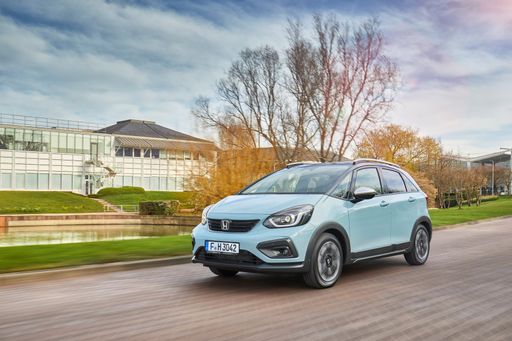 @ hondanews.eu
@ hondanews.eu
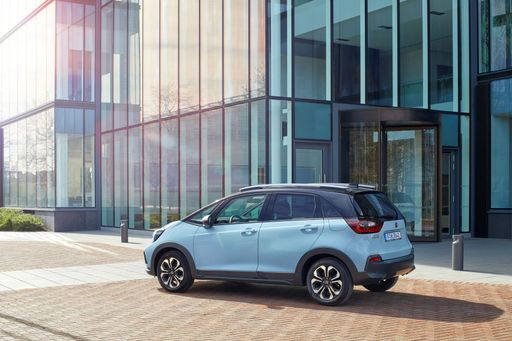 @ hondanews.eu
@ hondanews.eu
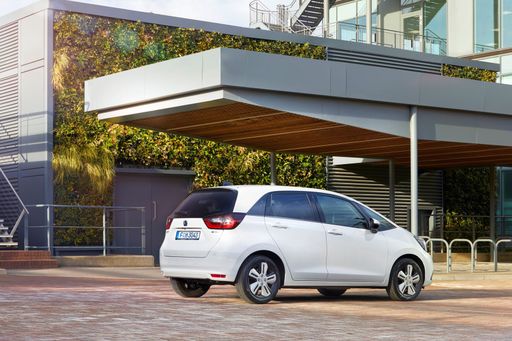 @ hondanews.eu
@ hondanews.eu
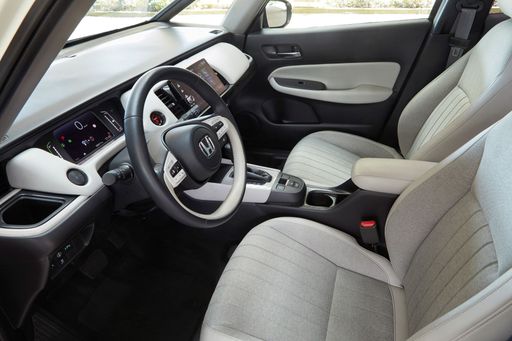 @ hondanews.eu
@ hondanews.eu
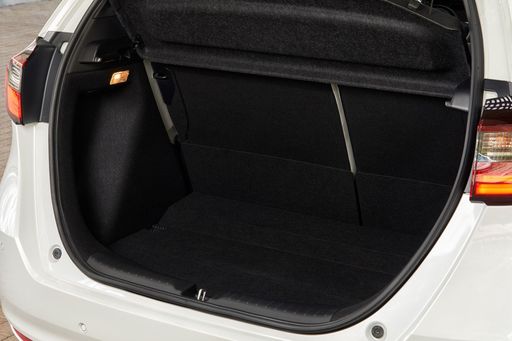 @ hondanews.eu
@ hondanews.eu

|

|
|
|
|
Costs and Consumption |
|
|---|---|
|
Price
32800 - 51000 £
|
Price
23100 - 26100 £
|
|
Consumption L/100km
0.4 - 8.5 L
|
Consumption L/100km
4.5 - 4.8 L
|
|
Consumption kWh/100km
-
|
Consumption kWh/100km
-
|
|
Electric Range
112 - 113 km
|
Electric Range
-
|
|
Battery Capacity
19.70 kWh
|
Battery Capacity
-
|
|
co2
8 - 193 g/km
|
co2
102 - 108 g/km
|
|
Fuel tank capacity
45 - 58 L
|
Fuel tank capacity
40 L
|
Dimensions and Body |
|
|---|---|
|
Body Type
SUV
|
Body Type
Hatchback
|
|
Seats
5
|
Seats
5
|
|
Doors
5
|
Doors
5
|
|
Curb weight
1598 - 1890 kg
|
Curb weight
1302 - 1320 kg
|
|
Trunk capacity
490 - 652 L
|
Trunk capacity
304 L
|
|
Length
4539 mm
|
Length
4089 - 4105 mm
|
|
Width
1842 - 1859 mm
|
Width
-
|
|
Height
1656 - 1658 mm
|
Height
1526 - 1556 mm
|
|
Payload
467 - 533 kg
|
Payload
370 - 388 kg
|
Engine and Performance |
|
|---|---|
|
Engine Type
Petrol MHEV, Plugin Hybrid, Diesel, Petrol
|
Engine Type
Full Hybrid
|
|
Transmission
Automatic
|
Transmission
Automatic
|
|
Transmission Detail
Dual-Clutch Automatic
|
Transmission Detail
CVT
|
|
Drive Type
Front-Wheel Drive, All-Wheel Drive
|
Drive Type
Front-Wheel Drive
|
|
Power HP
130 - 272 HP
|
Power HP
122 HP
|
|
Acceleration 0-100km/h
5.9 - 10.6 s
|
Acceleration 0-100km/h
9.4 - 9.7 s
|
|
Max Speed
198 - 242 km/h
|
Max Speed
175 km/h
|
|
Torque
220 - 400 Nm
|
Torque
253 Nm
|
|
Number of Cylinders
4
|
Number of Cylinders
4
|
|
Power kW
96 - 200 kW
|
Power kW
90 kW
|
|
Engine capacity
1498 - 1984 cm3
|
Engine capacity
1498 cm3
|
General |
|
|---|---|
|
Model Year
2024
|
Model Year
2023
|
|
CO2 Efficiency Class
E, B, F, G
|
CO2 Efficiency Class
C
|
|
Brand
VW
|
Brand
Honda
|
VW Tiguan
Introducing the VW Tiguan: A Blend of Style and Innovation
The VW Tiguan has consistently been a popular choice among SUV enthusiasts, combining practicality with a touch of elegance. In the latest iteration, Volkswagen has continued this tradition with a range of technical updates and innovations.
Powertrains: Versatility Meets Efficiency
The VW Tiguan comes with a variety of engine options, catering to different preferences and needs. From the efficient petrol mild-hybrid variants to the environmentally friendly plug-in hybrids, and the robust diesel engines, there is something for everyone. The power output ranges from a modest 130 PS to an impressive 272 PS, ensuring that drivers can enjoy a powerful and dynamic driving experience.
Innovation remains at the heart of the Tiguan’s engineering. The plug-in hybrid models, for example, boast an electric range of up to 113 km, making them ideal for those looking to reduce their carbon footprint while still enjoying the flexibility of a traditional engine.
Advanced Transmission and Drivetrain
Equipped with a smooth and responsive automatic transmission, the Tiguan ensures a comfortable drive. The dual-clutch gearbox provides quick and seamless gear changes, enhancing the driving experience. Additionally, the Tiguan is available in both front-wheel and all-wheel drive configurations, offering excellent traction and stability across different driving conditions.
Performance and Efficiency
The Tiguan's performance capabilities are complemented by its efficiency. With fuel consumption as low as 0.4 L/100km for hybrid models, owners can enjoy long trips with fewer stops for refuelling. The CO2 emissions are also impressively low, aligning with modern environmental standards and expectations.
Design and Dimensions
The Tiguan’s aesthetic appeal is undeniable, with a robust character that exudes confidence and sophistication. Its dimensions—4,539mm in length, 1,842 to 1,859 mm in width, and up to 1,658mm in height—provide ample interior space, making it a versatile vehicle for families and adventure seekers alike.
Practicality is further emphasised by its sizeable boot space, ranging from 490 to 652 litres, ensuring plenty of room for luggage or shopping.
Safety and Technology
Volkswagen has not compromised on safety or technology. The Tiguan is equipped with the latest driver assistance systems, ensuring a safe journey for its occupants. Features like adaptive cruise control, lane assist, and emergency braking provide an extra layer of protection.
Pricing and Value
Starting from €38,250 to €59,535, the Tiguan offers a range of specifications and features to match different budgets. When considering the advanced technology, engine options, and the premium feel of the cabin, it presents excellent value for money.
Conclusion: The Ultimate SUV Experience
The VW Tiguan continues to impress with its blend of innovative technology, performance, and practicality. Whether you’re looking for an eco-friendly hybrid with a long electric range or a powerful diesel for longer hauls, the Tiguan provides an all-encompassing solution. With its refined design and superior comfort, it remains a leading choice in the SUV segment.
Honda Jazz
The Evolution of the Honda Jazz: A Modern Marvel in Compact Design
The Honda Jazz, known for its compact yet spacious design, continues to impress with its blend of practicality and innovation. Today, we delve into the technical details and innovations that make the latest models of the Honda Jazz stand out in the competitive auto market.
Hybrid Powertrain: Efficiency and Performance
The Honda Jazz is equipped with a cutting-edge 1.5 i-MMD e:HEV full hybrid engine, delivering an impressive 122 PS, or 90 kW. This powertrain seamlessly balances efficiency and performance, achieving a fuel consumption of 4.5 to 4.8 L/100km. Whether navigating the city streets or taking on longer journeys, the Jazz provides a responsive and smooth driving experience, accentuated by its CVT automatic transmission.
Sleek Design with Smart Storage Solutions
Staying true to its roots, the Honda Jazz maintains a compact exterior with dimensions ranging from 4089 to 4105 mm in length and 1526 to 1556 mm in height. Despite its size, the Jazz offers ample luggage capacity of 304 litres, thanks to the intelligent Magic Seat system that allows for flexible storage configurations. The combination of a sleek design with practical storage makes the Jazz an ideal city companion.
Advanced Technology and Comfort
The Honda Jazz doesn’t stop at efficiency; it also comes packed with a plethora of technological features. As part of its high-tech package, the Jazz includes a state-of-the-art infotainment system and various driving assistance technologies, enhancing both safety and comfort. Families and commuters alike will appreciate the thoughtfully designed interior, seating up to five passengers with ease.
Performance and Handling Dynamics
The driving experience of the Honda Jazz is primarily characterised by its lively handling and assured grip thanks to its front-wheel-drive configuration. With a torque of 253 Nm and a 0-100 km/h acceleration between 9.4 to 9.7 seconds, the Jazz offers adequate performance for everyday urban driving. The maximum speed reaches 175 km/h, ensuring the Jazz can hold its own on motorways too.
Environmental Responsibility and Cost Efficiency
In an era of heightened environmental awareness, the Honda Jazz stands out with a CO2 emission range of 102 to 108 g/km, adhering to the CO2 Efficiency Class C. Cost-conscious consumers will appreciate the Jazz's low running costs, with potential expenses ranging from €812 to €877 per month and a cost per kilometre of 32.5 to 35.1 cents.
Conclusion: A Comprehensive Package
Combining innovation, economy, and style, the Honda Jazz serves as a testament to Honda's commitment to evolving their compact range to meet the modern driver's needs. For those seeking a reliable, efficient, and technologically advanced vehicle, the Honda Jazz stands ready to elevate their driving experience.
The prices and data displayed are estimates based on German list prices and may vary by country. This information is not legally binding.
